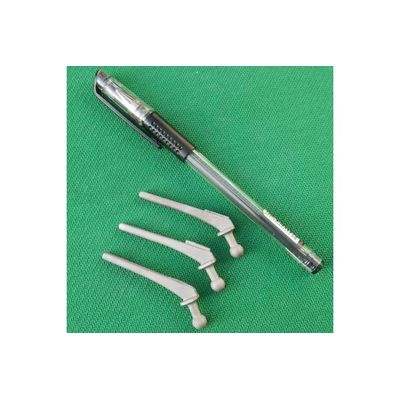

- Home
- Companies
- Shanxi Woge Technology Co., Ltd.
- Products
- Artificial Joint Blank Pet Joint Handle ...

Artificial Joint Blank Pet Joint Handle Casting
Cobalt chromium molybdenum joint casting Material: CoCrMo Application: For artificial joints Processing technology: Vacuum precision casting Heat treatment: Solution heat treatment
Cobalt-chromium-molybdenum alloy (CoCrMo) compared with stainless steel (316L), artificial joints made of cobalt-chromium-molybdenum alloy (CoCrMo) have better biocompatibility, wear resistance, corrosion resistance, strength and toughness. , so it lasts longer.
It is reported that stainless steel is the earliest human metal implant material. It has excellent processing performance and appropriate compressive strength. However, it has been clinically shown that after 316 stainless steel is implanted into the human body, crevice corrosion or friction corrosion and fatigue may sometimes occur in the physiological environment. Corrosion and cracking and other problems, and Ni2+, Cr3+ and Cr5+ will be released due to friction and wear, which will cause prosthesis loosening or malignant tumors, and eventually lead to implant failure. Therefore, countries such as Europe and the United States have restricted the clinical use of stainless steel.
CoCrMo alloy has become a research hotspot in the field of modern medicine because of its high comprehensive mechanical properties, but it is not suitable for machining, and usually adopts precision casting. The American Society for Testing and Materials recommends four cobalt-based alloys that can be used in surgical implants, they are: wrought Co-Cr-Mo alloy, wrought Co-Cr-W-Ni alloy, and wrought Co-Ni-Cr-Mo alloy , Forging Co-Ni-Cr-Mo-W-Fe alloy. Among them, forged Co-Cr-Mo alloy and forged Co-Ni-Cr-Mo alloy have been widely used in the manufacture of implants.
The precision casting process can effectively control the grain size, material purity, and metallurgical casting defects of cobalt-chromium-molybdenum alloy castings, which in turn can make the mechanical properties and biocompatibility of the product more superior to meet the needs of users and patients.
Extended information: Artificial joints, also known as surgically implanted bone and joint prostheses, are biomaterial products mainly used to treat deformity, pain or loss of function, and must have the following characteristics: non-toxic, non-carcinogenic, non-repelling, good Mechanical properties and process forming properties, etc.
